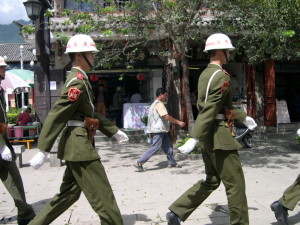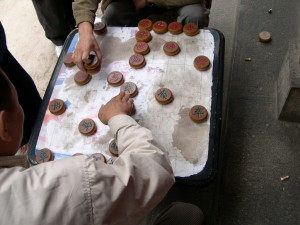Why Study Chinese?
What’s So Fascinating About Chinese Culture, Chinese History and the Chinese Language?
The following is a consideration of why China and its language and culture are interesting as a field of study, as an aid to those thinking about whether or not to engage in such studies.
The reader may or may not agree with some of the points below, but they are at least a starting point for thinking about the subject.
- China and its language and culture are so different from what we Americans are used to.
- China is basically unknown to us, or at least, it is known only superficially. It is either omitted in our school curriculum, or is covered so briefly as to be essentially meaningless in conveying substantive information about China and Chinese civilization. What we do know is that its history is long and cruel and filled with dynasties, rebellions, revolutions and megadeaths; its art and aesthetics are beautiful and its gōng fū movies are popular.
- Chinese civilization is ancient (3000+ years old,) compared to the West, and to the US (200+ years) in particular.
- China is a huge country with a huge population: the third largest country in land area (after Russia and Canada, although the US Govt. Factbook lists China as ‘slightly smaller than the US’) and the largest in population (just under 1.3 billion, with India a close second at under 1.1 billion). By comparison, the US is the fourth largest country in land area, after China …and our population (300+ million) is less than 1/4 the size of China’s.
- Some areas of China are among the most densely populated areas in the world.
- Topographically, most of China is either mountains or deserts.
- Arable land is located mostly in the river flood plains (largely the Yellow, Yangtze and Pearl River systems which also contain most of the population …and which comprise less than 15% of the total land area of China). This is one reason that the Chinese have been terracing mountainsides for thousands of years and also the reason for the density of China’s populated areas which are predominantly in those three river systems.
- The food is always tasty, often spicy and usually very fragrant. (The chili pepper was introduced into China by the Portuguese only in the 16th Century.)
- At first blush the language seems as inscrutable (to use a word that has long been applied to the Chinese) as its characters are beautiful.
- In the 1970’s, Japanese was often touted as the language to learn for international business …and then after Dèng Xiǎopíng came to power in 1978, China began to ‘take off’ economically in the 1980s. Now most people would probably agree that the important foreign language for business in the 21st century is definitely Chinese …and the Chinese, perhaps not surprisingly given their history, are very good at doing business.
- Understanding the country and its people is difficult, as is learning the language …which means that successfully doing so is a rather creditable accomplishment (for those of us who respond to challenges). Its difficulty is recognized by the Chinese themselves: they respect foreigners who take the trouble to learn their language, and are impressed by those who are successful at it. …And generally speaking, there’s not much about the foreign world or foreigners that will impress the Chinese.
- So many aspects of its culture and history are interesting and attractive …a short list, well, maybe not so short, (in no particular order):
- the Dào Dé Jīng (the Way), the Yì Jīng (the Book of Changes), Daoism and Lǎo Zǐ (pron.: Lǎo dž);
- Confucius, the Analects, Confucianism and Mencius;
- Chinese Buddhism and the changes it brought to China;
- Chinese literature and the Chinese literary classics;
- Chinese gōng fū, tài jì quán (pron.: tài jì chuén,) and other Chinese martial arts (wǔ shù [pron.: oǒ shù] in Chinese) and weapons;
- Chinese art and calligraphy;
- Chinese astrology, fēng shuǐ and Yīn/Yáng;
- Chinese characters;
- Marco Polo, the Silk Road and silk culture and art;
- Ferghana Valley horses and their influence on Chinese history;
- Chinese medicine and acupuncture;
- Chinese handicrafts and porcelain;
- footbinding;
- Mah Jong, Go, Chinese chess and other Chinese games;
- Chinese mythology and mythical animals- dragons, phoenixes and the qí lín (pron.: chée lín);
- Chinese food …so many different cuisines;
- tea, tea culture and pottery;
- the Forbidden City, the Emperors, the eunuchs and the concubines;
- the Imperial examination and the innovation of the Chinese Civil Service;
- the non-Chinese dynasties in China:
- the Tangut Empire (the Western Xià Dynasty)
- the Khitan Empire (the Liáo Dynasty)
- the Mongol incursions into China: Gengis Khan and Kubilai Khan (the Yuán Dynasty)
- the Jurchen in northern China (the Jīn dynasty)
- the Manchu (the Qīng dynasty)
- the other dynasties and the existence of a Chinese dynastic empire for so long (2,133 years);
- the influence of China on other countries in Asia, particularly Korea, Japan and Vietnam, as well as the rest of the world;
- the 18th, 19th and 20th century era of colonialism in China;
- the seeming uniformity of the Chinese and the differences among the Chinese peoples …so many different languages and cultures that from a distance seem the same;
- traditional Chinese architecture;
- jade and jade culture;
- Chinese vases, objet d’art and cloisonné;
- Chinese inventions;
- comparisons between Chinese history, culture, inventions and art and Western history, culture, inventions and art;
- 20th century Chinese history and its relation to the US and western nations;
- the Qīng (pron.: Chīng) Dynasty, Sun Yatsen, the founding of the Chinese Nationalist Party and the Republic of China;
- Máo Zédōng;
- China’s Civil War and the struggle for power by the Communist Party;
- the incredible feat of determination and endurance of the 1934-35 Long March to Yán’ān (in Shaanxi 陝西/陕西);
- Máo’s post-revolutionary China: the ‘Great Leap Forward’ and the resultant famine that killed millions, the Hundred Flowers Campaign and the Cultural Revolution;
- Dèng Xiǎopíng and the post-1978 changes to China’s economy;
- the vibrancy of the present-day Chinese economy with its astoundingly consistent 10+% annual growth rate for over 30 years (until recently);
- the changes in modern China and particularly the skyline and infrastructure changes in modern Chinese cities like Hong Kong, Běijīng and Shànghǎi;
- the persistence in power of the Communist Party;
- Xī’ān (pron.: Shēe āhn), the Qín (pron.: Chín) Dynasty and the terracotta warriors;
- the Great Wall;
- bamboo and its uses;
- Panda bears;
- tofu;
- rice, rice culture and its impact on Chinese history;
- Tibet, Tibetan Buddhism and the Tibetan Book of the Dead;
- Zhèng Hé (pron.: Jùng Hé) and the 15th Century Chinese fleet as a reflection of the relative power of China in Míng and pre-Míng periods, and the relative weakness of China in the Qīng and most of the post-Qīng period;
- the Chinese Zodiac;
- etc., etc., etc.
 A People’s Armed Police militia unit marches in the street
A People’s Armed Police militia unit marches in the street
It seems that there are so many things about China that are interesting, that a logical place to start might be with the Chinese language. There are certainly many places to start, and where you start really depends on your particular interests.
Some people start with an interest in gōng fū, tài jì quán or some other Chinese martial art, some start with their fascination for jade, cloisonné, porcelain or other Chinese objet d’art, some with the food.
Any starting point is a good entry point, just because of the nature and breadth of the subject …and most of these interests, if deep, will eventually lead to a study of the language.
And, if the above ideas haven’t sparked an interest in Chinese Studies, there is an even more practical reason to study the language and the culture: career advancement.
Because of the dynamism and development of the Chinese economy in the past 35+ years, it has been postulated by some economists that over the next 20 years, some 20% (or more,) of the growth in the world’s economy may take place in China. This is why many Western companies are now trying to get a foothold inside China. And that is also why the Chinese government jealously protects parts of its economy from foreign competition… for example, Twitter, Google, Facebook and Yahoo are locked out, so that Chinese companies like Weibo, Alibaba, Baidu, Tencent and others can develop strong presences able to withstand foreign competition. Similarly, financial services, insurance and retail banking are also market sectors in the ‘protected’ category.
 Old Dai Woman in Lìjiāng, Yúnnán
Old Dai Woman in Lìjiāng, Yúnnán
American companies recognize that future growth in their own industries, markets and companies (not to mention profits!,) requires a presence in China so that they can participate when the Chinese domestic economy does develop into a demand-driven mass-market engine. And what an engine it could be …with over a billion consumers! The problem of course being that the Chinese have traditionally been, and still are, high savers… and getting them to spend income like ‘consumers’ in the West is likely to be an overwhelmingly difficult thing to do. (The Chinese savings rate often approaches 50% of income.)
— While the Chinese typically have sent their ‘best and brightest’ to American and European universities to develop a depth of knowledge in all fields, and to absorb Western ideas for application within their own economy, it is still likely that they will need Americans (or at least ‘outsiders,’) with both a knowledge of the Chinese language and depth in business fields such as marketing, distribution, product development, etc., to help in the development of their domestic market, no matter how much they may want to do it themselves.
— And, even if they are able to do it themselves, the American economy, to remain vibrant, growing and healthy, must participate in the development of the Chinese domestic economy through continued technology transfers, as well as through the export of financial and other services and high-value-added products.
Initially, beginning in the 1980s, China largely relied on local (that is, linguistically talented English-speaking Hong Kong and Taiwanese) entrepreneurs as owners and/or managers of the factories that made and sold the export products that have built their modern manufacturing economy. Then later, they began accepting foreign money and ownership of plants. And boy, how the investment money rolled in!
In the future, it is likely that foreign managers for more ‘downstream’ industries will be needed, and these downstream industries have little or no presence in Hong Kong and Táiwān, because those domestic markets are too small.
China will need everything from chainstore operators to distributors to mass-market discount stores. And everything from manufacturers of household electrical products to drug companies researching and developing new medicines.
And all of this on an almost unimaginably large scale, to serve a present population of almost 1.3 billion consumers. All one need do is look at the developed markets of the West, Japan and Korea to see where the Chinese are headed.
Americans who want to participate in that resultant Chinese economy without a serious competitive disadvantage will need to be able to function as well inside China (in the Chinese language) as the Chinese function outside China in the rest of the world …which most American businesspeople presently cannot do.
The Europeans, Japan and Korea are already preparing: literally thousands of Europeans, Koreans, and Japanese study Chinese in language schools and universities in China every year …and they, as well as the Chinese themselves, represent the competition!
The number of Americans presently studying Chinese in China represents a very small minority of the foreign students there (it is possible that less than 5% of the foreign students studying in Chinese language schools are American: whatever the actual number, a rather dismal showing considering the size of our economy and the economic importance of China to us).
To at least the Koreans and the Japanese, China isn’t some distant country …it is literally on their doorsteps. And both Korea and Japan have had historic and continuing contact with the Chinese, for better or worse for all involved, for thousands of years. They see the rise of China once again to great power status as (in the biblical phrase,) both a blessing and a curse.
 Playing Chinese chess in the street
Playing Chinese chess in the street
A blessing because, like the rest of the commercial world, they see the potential of the market in a risen China. And any thoughtful entrepreneur who sees that, certainly intends to participate and derive profit from it. To do otherwise would not be either prudent or profitable!
A curse because, aside from the obvious potential for conflict in the competition for scarce resources, on the economic side the rise of China will continue to require many changes to the economies of both Korea and Japan. Competition from a low-wage but high-value China is already forcing drastic changes in the economies of the entire developed world.
So, what are we doing to prepare our economy for the opportunities and challenges of a demand-driven mass-market domestic Chinese economy, and for the competition that such an economy might offer? Mmmm………..?
For a student preparing for a career in business or in a high-tech field, developing a fluency in the Chinese language and an understanding of Chinese culture could be a definite asset. Some American companies have already begun to look for young people with this ability to staff their branches in China. Others will undoubtedly begin to do so over the next few years. Initially, they will need specialists fluent in Chinese to work in home offices with higher executives who will be traveling with greater frequency to China to do business.
Eventually, those executives will themselves be knowledgeable about Chinese culture and fluent in Chinese, able to conduct business in China without the assistance of translators or aides. Just look at Facebook’s Mark Zuckerberg as an example of this kind of Chinese-language preparation. And he doesn’t have any operations in China …yet. Clearly, he is not just looking at tomorrow’s needs, but longer term. And with somewhere between 650 and 800 million Internet users, China represents a huge potential market.
© R. Teller, 2015
All photographs on this and succeeding pages (unless otherwise noted) are © R. Teller, 2001-2015
 Business signs dominate a typical street in Hong Kong (Click on photographs to enlarge, then click on your browser’s ‘back’ button to return to text.)
Business signs dominate a typical street in Hong Kong (Click on photographs to enlarge, then click on your browser’s ‘back’ button to return to text.)
